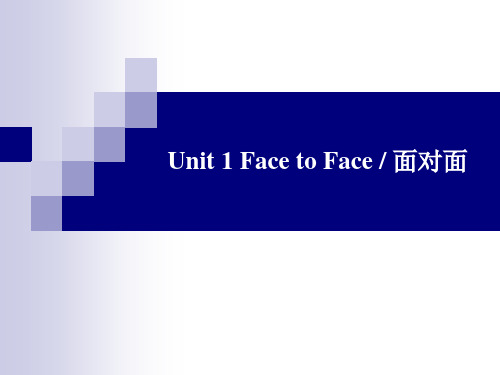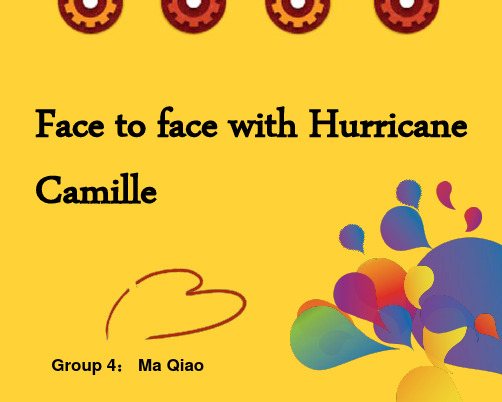Unit One face to face
- 格式:ppt
- 大小:513.50 KB
- 文档页数:45
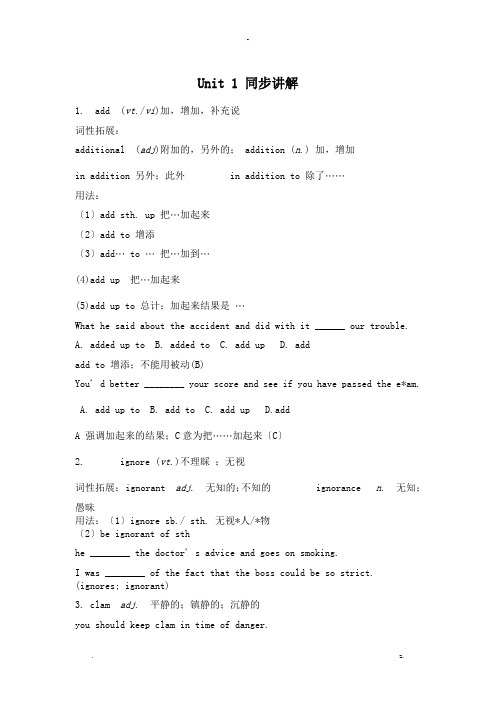
Unit 1 同步讲解1.add (vt./vi)加,增加,补充说词性拓展:additional (adj)附加的,另外的; addition (n.) 加,增加in addition 另外;此外 in addition to 除了……用法:〔1〕add sth. up 把…加起来〔2〕add to 增添〔3〕add… to …把…加到…(4)add up把…加起来(5)add up to 总计;加起来结果是…What he said about the accident and did with it ______ our trouble. A. added up to B. added to C. add up D. addadd to 增添;不能用被动(B)You’d better ________ your score and see if you have passed the e*am.A. add up toB. add toC. add upD.addA 强调加起来的结果;C意为把……加起来〔C〕2. ignore (vt.)不理睬;无视词性拓展: ignorant adj.无知的;不知的 ignorance n.无知;愚昧用法:〔1〕ignore sb./ sth. 无视*人/*物〔2〕be ignorant of sthhe ________ the doctor’s advice and goes on smoking.I was ________ of the fact that the boss could be so strict. (ignores; ignorant)3. clam adj.平静的;镇静的;沉静的you should keep clam in time of danger.区别:silent 不说话,不出声;quite 安静的;宁静的;still 不动的;强调“静止状态〞;clam指人“沉着,镇定〞;指自然“无风无浪〞。
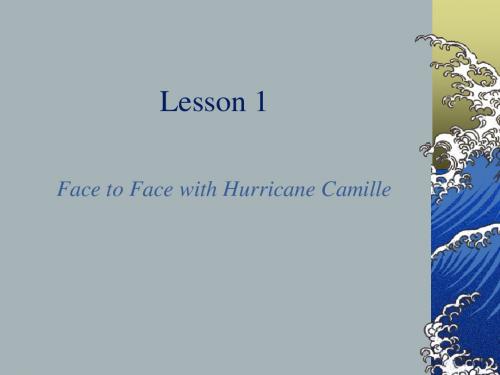
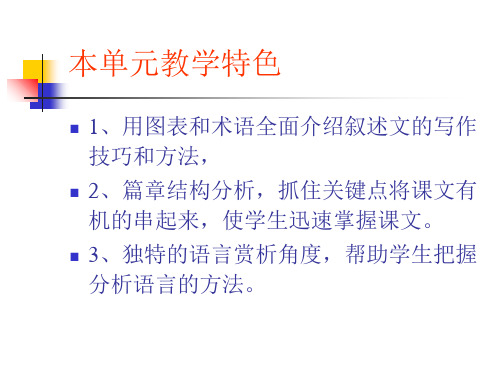
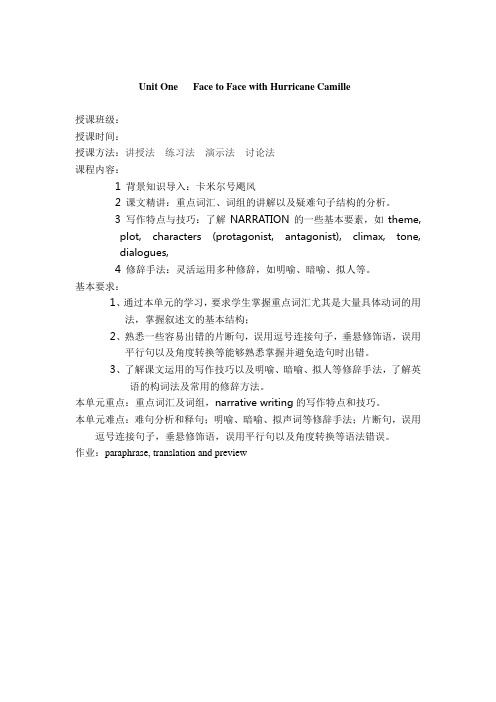
Unit One Face to Face with Hurricane Camille
授课班级:
授课时间:
授课方法:讲授法练习法演示法讨论法
课程内容:
1 背景知识导入:卡米尔号飓风
2 课文精讲:重点词汇、词组的讲解以及疑难句子结构的分析。
3 写作特点与技巧:了解NARRATION的一些基本要素,如theme, plot,
characters (protagonist, antagonist), climax, tone, dialogues,
4 修辞手法:灵活运用多种修辞,如明喻、暗喻、拟人等。
基本要求:
1、通过本单元的学习,要求学生掌握重点词汇尤其是大量具体动词的用
法,掌握叙述文的基本结构;
2、熟悉一些容易出错的片断句,误用逗号连接句子,垂悬修饰语,误用
平行句以及角度转换等能够熟悉掌握并避免造句时出错。
3、了解课文运用的写作技巧以及明喻、暗喻、拟人等修辞手法,了解英
语的构词法及常用的修辞方法。
本单元重点:重点词汇及词组,narrative writing的写作特点和技巧。
本单元难点:难句分析和释句;明喻、暗喻、拟声词等修辞手法;片断句,误用逗号连接句子,垂悬修饰语,误用平行句以及角度转换等语法错误。
作业:paraphrase, translation and preview。
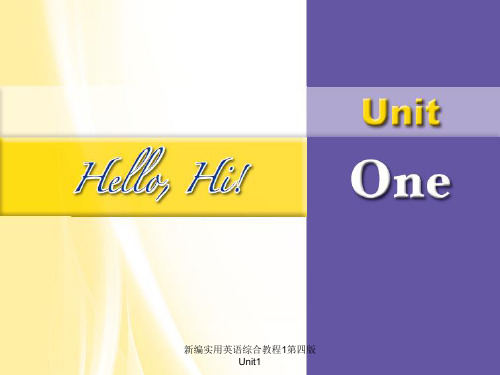
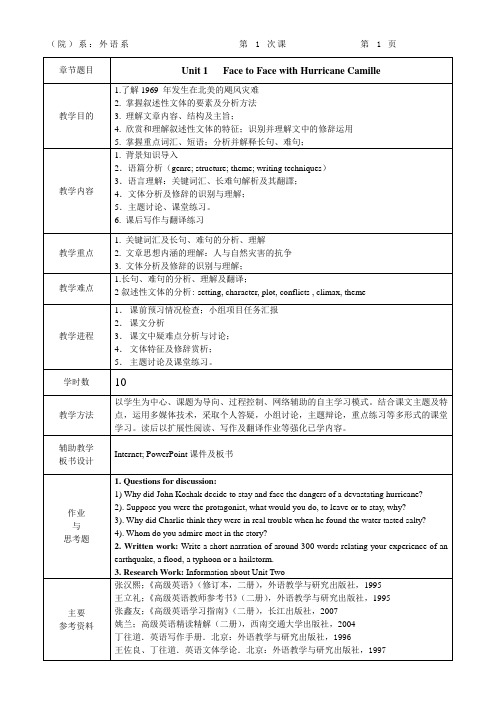
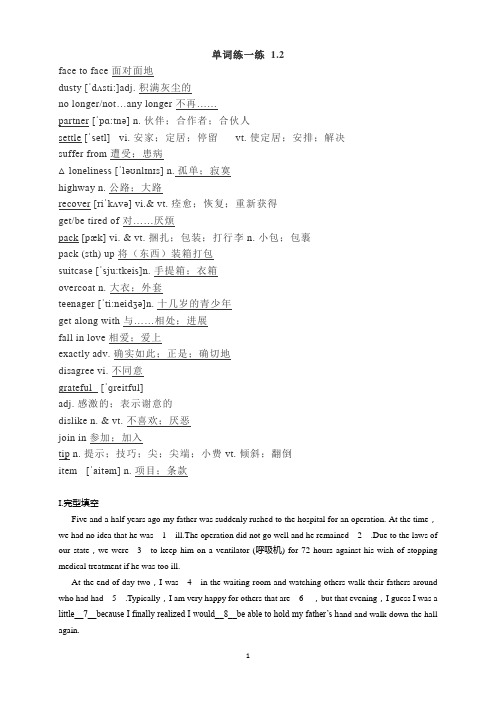
单词练一练 1.2face to face 面对面地dusty [ˈdʌsti:]adj. 积满灰尘的no longer/not…any longer 不再……partner [ˈpɑ:tnə] n. 伙伴;合作者;合伙人settle [ˈsetl]vi. 安家;定居;停留vt. 使定居;安排;解决suffer from 遭受;患病△loneliness [ˈləʊnlɪnɪs] n. 孤单;寂寞highway n. 公路;大路recover [riˈkʌvə] vi.& vt. 痊愈;恢复;重新获得get/be tired of 对……厌烦pack [pæk] vi. & vt. 捆扎;包装;打行李n. 小包;包裹pack (sth) up 将(东西)装箱打包suitcase [ˈsju:tkeis]n.手提箱;衣箱overcoat n. 大衣;外套teenager [ˈti:neidʒə]n. 十几岁的青少年get along with 与……相处;进展fall in love 相爱;爱上exactly adv. 确实如此;正是;确切地disagree vi. 不同意grateful [ˈɡreitful]adj. 感激的;表示谢意的dislike n. & vt. 不喜欢;厌恶join in 参加;加入tip n. 提示;技巧;尖;尖端;小费vt. 倾斜;翻倒item [ˈaitəm] n. 项目;条款I.完型填空Five and a half years ago my father was suddenly rushed to the hospital for an operation. At the time,we had no idea that he was__1__ill.The operation did not go well and he remained__2__.Due to the laws of our state,we were__3__to keep him on a ventilator (呼吸机) for 72 hours against his wish of stopping medical treatment if he was too ill.At the end of day two,I was__4__in the waiting room and watching others walk their fathers around who had had__5__.Typically,I am very happy for others that are__6__,but that evening,I guess I was a little__7__because I finally realized I would__8__be able to hold my father’s h and and walk down the hall again.I had to jump up and run down the hall to__9__everyone.This was not in my nature but I just had to be__10__.After running for what seemed like a long time,I went into a rest room. I sat in a stall (小隔间) and__11__for at least five minutes.When I came out of the stall there was a__12__by the sink. I went to__13__on the water to wash my face and she came to hug me though I didn’t know her. She held onto me__14__I finally stopped crying. Then she grabbed a paper towel,wet it and__15__it to me. She looked at me and smiled and then left. She never spoke one word but she touched my__16__.She__17__me that you do not need to be a conversationalist to help__18__the hurt in others.Never__19__to hug someone who may need it today. You can make a_20__in someone’s life without ever speaking one word.1.A.slightly B.seriously C.probably D.simply2.A.uncomfortable B.uneasy C.unfortunate D.unconscious3.A.inspired B.trained C.forced D.forbidden4.A.sitting B.playing C.chatting D.reading5.A.dinners B.doubts C.ideas D.operations6.A.changing B.recovering C.returning D.leaving7.A.angry B.pleased C.curious D.foolish8.A.even B.still C.never D.always9.A.catch up with B.adapt to C.play jokes on D.get away from10.A.single B.alone C.negative D.impolite11.A.cried B.shouted C.laughed D.complained12.A.doctor B.manager C.stranger D.nurse13.A.turn B.put C.take D.try14.A.but B.since C.when D.until15.A.said B.handed C.lent D.sold16.A.face B.hair C.heart D.leg17.A.taught B.promised C.reminded D.introduced18.A.see B.remember C.describe D.heal19.A.learn B.hesitate C.continue D.dream20.A.choice B.mistake C.difference D.decisionII 阅读理解AJenny,I often think if I am as important to you as you are to me.We had an unhappy time yesterday. I really felt sad after it and almost apologized(道歉)to you. However, you could still laugh and talk with others like nothing had happened. I suddenly realized that I was not that important to you. You didn't even realize that I was angry and sad. What's more, you even forgot my birthday this year.Goodbye, my friend. I have closed my feeling toward you. It is to say goodbye, my friend. But it is meaningless(无意义的)for us to be friends any longer.Lucy Dear Lucy,I'm sorry that I hurt you so much yesterday. But here is something I really need to tell you. I never thought the quarrel we had yesterday was as serious as you thought. I just felt tired and didn't feel like going shopping. Susan and Lily are also my good friends. I couldn't pretend(假装)not seeing them when they passed by. I also couldn't let them know I was blue because of the quarrel. I didn't want them to feel sad just because I was sad. I'm your best friend, but I don't want to be your only friend. I don't want to be with you all the time because sometimes I need to have my own time. I want to spend some time with my other friends and my brother. Please try to make more friends. You will feel much happier if you have more friends. And remember, I'm your best friend forever!Jenny 21.What's the purpose of Lucy's letter?A.To tell Jenny that she is really sorry for what happened yesterday.B.To tell Jenny she doesn't want to be friends with her any longer.C.To ask Jenny not to be friends with Susan or Lily.D.To ask Jenny if she means much to her.22.In the letter, Jenny suggests Lucy should________.A.make more friends B.leave her aloneC.make friends with Susan and Lily D.spend more time with her family23.According to the passage, if we say someone is blue, we mean he/she is________.A.angry B.sad C.kind D.happy24.After reading Jenny's letter, we learn that________.A.Jenny and Lucy are both students B.Lucy doesn't know how to keep a healthy friendship C.a friend in need is a friend indeed D.Lucy is Jenny's only friend七选五根据短文内容,从短文后的选项中选出能填入空白处的最佳选项。

《新编实⽤英语》第⼀册教案《新编实⽤英语》第⼀册教案Unit OneGreeting and Introducing PeopleTeaching ObjectiveIn "Talking Face to Face",learn how to greet people and how to make introductions.In "Being All Ears", practice listening comprehension to greet and introduce people with various relationships.In "Maintaining a Sharp Eye",master the key words and structures and learn the way foreign people greet each other, particularly the way Americans meet and greet each other, both in informal and formal situations by reading through passage I; learn and practice how to introduce oneself by reading through passage II.In "Trying Your Hand", become knowledgeable on how to write a business card and fill in a passport with one’s personal information; review the basic sentence structure. Teaching ProceduresSection I Talking Face to Face1.Warm- up:Expressions of greetings and responses to greetings:a. Greetings:1) Hi! How do you do?2) Hello, you must be Jack from America.3) How are you?4) Hello. How are things with you? How are you doing?5) How is everything?6) You are doing all right?7) How it goes?8) How is life, John?9) Excuse me. Are you Kitty?b. Responses to Greetings:1) How do you do?2) Fine, just fine.3) Fine, thank you.4) Quite well. And you?5) The usual. How about you?6) So-so. And what about you?7) Nothing particular.8) Not too bad.9) Nice to meet you.10) Very happy to see you.2.Introduction of the samples of business cards and passport3. Practice the two dialogues in Follow the Samples4. Practice dialogues according to the given tasks5. ExercisesSection II Being All EarsSee the textbook.Section III Maintaining a Sharp EyePassage I The Way Americans GreetText-Related Information1. GreetingThe simplest thing to say is "Good morning," "Good afternoon'" or "good evening." This greeting is given to one whom you know only slightly, or to any one you are passing quickly. "How are you" is usually used when you are not in such a hurry. No answer is expected other than "Fine, thank you." "Hello" is the commonest form of greeting between good friends.2. When to Shake HandsIt is customary to shake hands when you first meet someone. And usually friends shake hands when they meet after not having seen each other for some time. However it is not necessary to shake hands.3. Common Titles in Englisha. Mr.:“先⽣”a courtesy title for any male adult not styled “Sir”, “Dr.” etc. used before the man’s family name or his position.b. Mrs.:“太太”a courtesy title for any married woman not styled “lady”, “Dr.”etc. used before her husband‘s surname.c. Ms.: “⼥⼠” a courtesy title for a woman, whether she is married or not, followed by the family name.d. Miss: “⼩姐”A title used to address an unmarried woman or a girl. It is followed by the family name. Miss can also be used as the title of address to an (esp. unknown) unmarried woman. In this case, it is not followed by the name.e. Lady: “夫⼈、太太、⼥⼠”a courtesy title for a woman with dignity or social grace. It is also an English title for the wife of a knight or a baronet.f. Dr. (Doctor): “医⽣、博⼠”the title of a medical practitioner or the title of the holder of the highest university degree. e.g. Doctor of Philosophy (PhD).g. Prof. (Professor):“教授”The title to address a university teacher of the highest rank in a faculty.h. Officer: “官员,警察先⽣” The title to address a person holding a publicappointment, aposition of responsibility and trust, such as a policeman or a customs officer.i. Sir: “先⽣、长官、爵⼠”A form of polite address to a man; A title preceding the first name of a knight (爵⼠) or a baronet (准男爵); A form of address in writing to a stranger or in business letters.4. Formation of Common English NamesA common English name is usually composed of two or three parts: the first name is also called forename. If the person is a Christian, his first name will be given at his baptism, so it is also called the given name or the Christian name. Middle name is the second given name. When written, middle name is often shortened to the initial letter. Surname is often the father‘s family name, so it is also called family name or last name. For example: Anne Louise Strong, George B. Show.Text ExplanationPara. 1Americans often greet each other simply with “Hello”or “Hi”. They believe such an informal greeting often implies a close and friendly relationship. Similarly, Americans do not have a formal “farewell”. They will just wave “good-bye” to the whole group. Or perhaps, they will simply say “Bye”, “So long” or “Speaking of time, I’ve got to run” and then leave. To Americans, a friendly and informal relationship is themost important thing.Language Points:1.Explanation of Difficult Sentences1) The Way Americans GreetAnalysis: In this title, in which is omitted after The way.“in ... way”means (to do something) by means of a certain method. Translation: 美国⼈的致意⽅式Example: I think the way she runs her bookshop is worth studying.2)Speaking of ... time, I’ve got to run.Analysis: A present participle clause used as an adverbial of cause/time. It means “when it comes to time, I’m reminded of …”Translation: 说到时间,我得赶紧跑了。
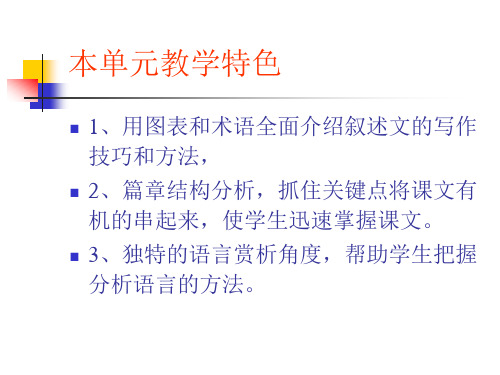
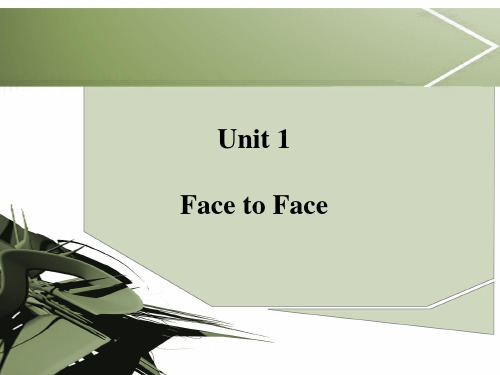
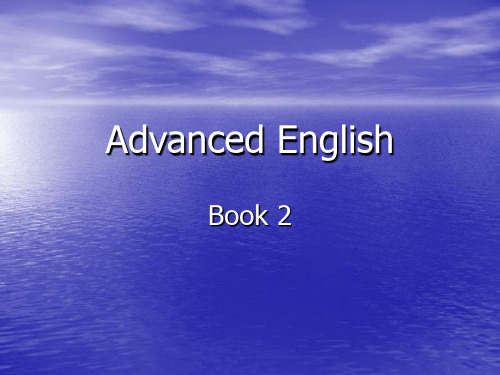
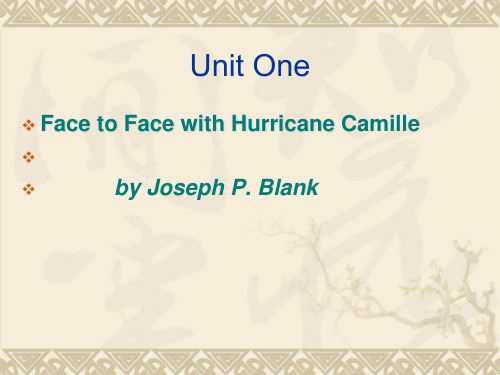
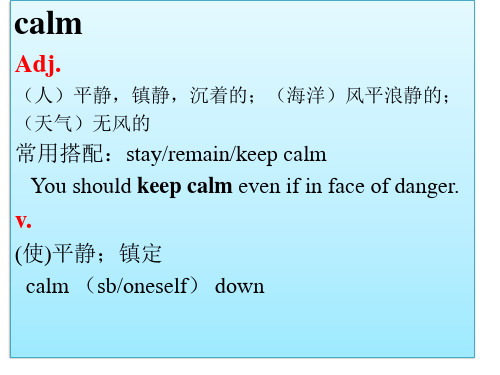


Unit SevenSection A: Face to Face with GunsEx. III, P 158Spell the following words with the help of their definitions and the first letters.1. identify;2. attach;3. instinct;4. polish;5. unusual;6. offend;7. detail;8. slight;9. foundation; 10. robEx. IV, P159Complete the following sentences with the words used in Exercise III. Change the form where necessary.1.details2.robbed3.offended4.polishing5.identify6.slight7.instinct8.attached9.foundation10.unusualEx. V, P159Fill in the blanks with the expressions given below. Change the form where necessary.1.attached to2.looking through3.hold dear4.pulling into5.face to face with6.rather than7.out of control8.eaten away at9.Have mercy on10.got to their feetVI P1601.G 2.H 3.J 4.L 5.O 6.A 7.C 8.M 9.D 10.EEx. VII, P 160Study the models and rewrite the following sentences with a “have + object + V-ed structure”.1.They should have their pay increased.2.I had my first book accepted for publication that year.3.George had his papers taken from him at the police station.4.I had my wallet stolen while I was on holiday.5.The couple are going to have their wedding photos enlarged at thestore.Ex. VIII, P 161Complete the following sentences by translating the Chinese into English, using “rather than”.1.rather than to her daughter2.rather than harm them3.rather than leaving everything to the last minute4.Rather than using the last of my cash5.rather than increase payEx. IX, P 161Translate the following sentences into English.1.The police had the photograph of the missing girl enlarged so thatthey could recognize her easily.2.When I go to work, I prefer to take a bus rather than drive, and thatmorning was no exception.3.When he saw his granddaughter coming into the house (seeing hisgranddaughter coming into the house ), the old man got to his feetand moved several steps unexpectedly as if he could walk by himself.4.At that time we focused our attention on that painting withoutnoticing anything unusual around us, and we can’t offer any additional details.5.The couple pulled their car into the parking lot and then headed forthe cinema.6.It’s a question we have to face no matter how unpleasant it is.X.P1621.经验告诉他,妇女的天性是保护自己而不是去伤害攻击者。

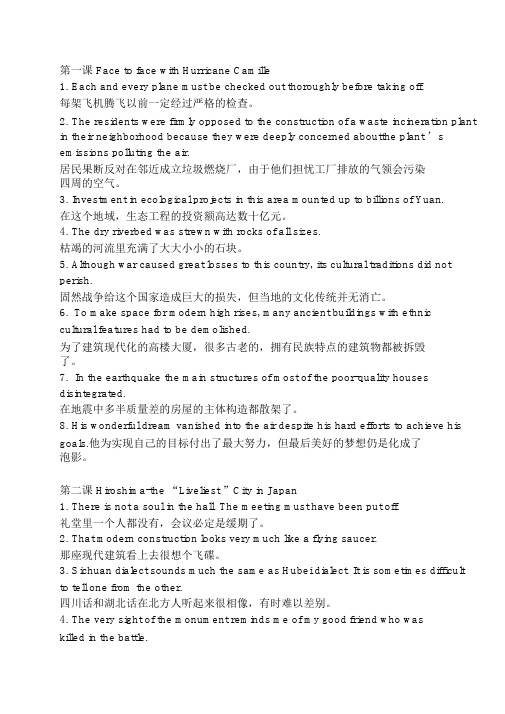
第一课 Face to face with Hurricane Camille1.Each and every plane must be checked out thoroughly before taking off.每架飞机腾飞以前一定经过严格的检查。
2. The residents were firmly opposed to the construction of a waste incineration plant in their neighborhood because they were deeply concerned aboutthe plant ’s emissions polluting the air.居民果断反对在邻近成立垃圾燃烧厂,由于他们担忧工厂排放的气领会污染四周的空气。
3.Investment in ecological projects in this area mounted up to billions of Yuan.在这个地域,生态工程的投资额高达数十亿元。
4.The dry riverbed was strewn with rocks of all sizes.枯竭的河流里充满了大大小小的石块。
5.Although war caused great losses to this country, its cultural traditions did not perish.固然战争给这个国家造成巨大的损失,但当地的文化传统并无消亡。
6.To make space for modern high rises, many ancient buildings with ethnic cultural features had to be demolished.为了建筑现代化的高楼大厦,很多古老的,拥有民族特点的建筑物都被拆毁了。
7.In the earthquake the main structures of most of the poor-quality houses disintegrated.在地震中多半质量差的房屋的主体构造都散架了。
